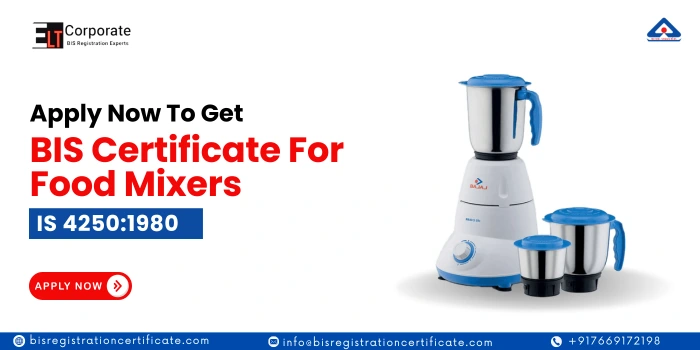In today’s competitive market, securing the BIS Certification for Domestic Electric Food Mixers is essential for manufacturers looking to sell their products in India. BIS Certificate ensures that your food mixers meet the standard set by the Bureau of Indian Standards.
To obtain BIS certificate for food mixers, manufacturers must comply with the relevant Indian Standard, IS 4250:1980 Domestic Electric Food Mixers. So, let’s explore the certification process, its benefits for your business, its importance, and many more queries.
Overview Of IS 4250:1980 For Domestic Electric Food Mixers
The IS 4250:1980 standard applies to BIS certificate for domestic electric food mixers designed for home use. These mixers operate at voltages not exceeding 250V and may include multipurpose machines used with specific accessories.
This standard covers safety and general requirements for domestic electric food mixers, ensuring they can mix liquids, create food slurries or pulps, and crush dry foodstuffs. The standard also outlines performance criteria essential for evaluating food mixer quality.
What Is BIS Certification For Domestic Electric Food Mixers IS 4250:1980?
The BIS Certificate for Domestic Electric Food Mixers, issued by the Bureau of Indian Standards, is a mandatory certification for electric food mixers as per IS 4250:1980. It ensures that electric food mixers comply with the safety, performance, and quality requirements outlined in this Indian Standard.
This certification guarantees that the product is safe and reliable and meets consumer expectations. For manufacturers, adhering to IS 4250:1980 fulfils regulatory compliance and builds market trust, ensuring smooth entry and sustained growth in the Indian market.
Why Is BIS Certification Important For Domestic Electric Food Mixers?
There are several reasons why it is important to obtain BIS certificate for food mixers, listed below:
- Safety First: The BIS ISI mark ensures food mixers are built with safety features to prevent issues like electric shocks, overheating, or mechanical failures. It’s all about keeping customers safe.
- Quality You Can Trust: Certified mixers use quality materials, making them durable, reliable, and long-lasting. Fewer breakdowns mean better value for money.
- Standardization: BIS sets uniform standards, making it easier for customers to compare products and make informed choices.
- Legal Requirement: Selling electric food mixers in India without the BIS ISI mark? Not allowed. Compliance is key to avoiding penalties and staying in the market.
- Customer Confidence: The ISI mark instantly reassures customers about safety and quality, helping build trust and brand loyalty.
- Competitive Edge: Certification gives your product credibility, setting it apart in a crowded market and opening doors for growth.
Steps To Obtain BIS Certificate For Food Mixers IS 4250:1980
Getting BIS certification for your domestic electric food mixers involves a detailed process. Here’s a breakdown of the key steps:
- Application: Start by applying online through the BIS portal. You’ll need to provide product details and submit company-related documents.
- Preparation and Testing: Gather samples of the food mixers you wish to certify. These samples must align with the IS code’s sampling and testing procedures and represent the final product you plan to certify.
- Choose a BIS-Recognized Laboratory: Send your samples to a BIS-approved laboratory. Ensure the lab is authorized to carry out the required tests based on BIS standards.
- Documentation: Prepare all necessary documents, including the BIS application form. This form can be downloaded from the BIS website or obtained from their regional offices.
- Submit Application: Once your application form is complete, submit it through the BIS online portal. Be sure to include the test report from the BIS-approved laboratory and the required government fee.
- Factory Inspection: BIS will conduct an inspection of the manufacturing facility to ensure that the production processes follow the required standards.
- Granting of Certification: If the product passes all tests and factory inspections, the manufacturer will be granted the ISI mark certification.
By following these steps, manufacturers can ensure their food mixers meet all BIS requirements and are ready for certification.
Documents Required For BIS Certification For Domestic Electric Food Mixers IS 4250:1980
To obtain BIS certification for domestic electric food mixers, the following documents are required:
- Copy of PAN Card and Aadhar Card of the authorized person
- Electricity bill of the firm
- Copy of GST certificate
- Certificate of incorporation
- Proof of ownership or lease for the premises
- Factory layout plan
- Detailed list of machinery used in production
- Product specifications
- Manufacturing flow process
- Factory location details
- List of testing equipment and facilities
Major Testing Parameters Performed By BIS-Approved Labs for Domestic Electric Food Mixers
BIS-approved labs conduct several tests to ensure domestic electric food mixers meet the required safety and quality standards. These include:
- Electrical Safety Tests: Ensuring the product doesn’t pose electrical hazards.
- Mechanical Safety Tests: Verifying the product’s mechanical integrity and safety.
- Performance Tests: Checking that the mixer operates efficiently and meets performance benchmarks.
Is 4250 BIS Standard?
Yes, IS 4250:1980 is a BIS standard for Domestic Electric Food Mixers (Liquidizers, Grinders, and Centrifugal Juicers). It specifies safety, performance, and quality requirements to ensure product reliability and user safety.








